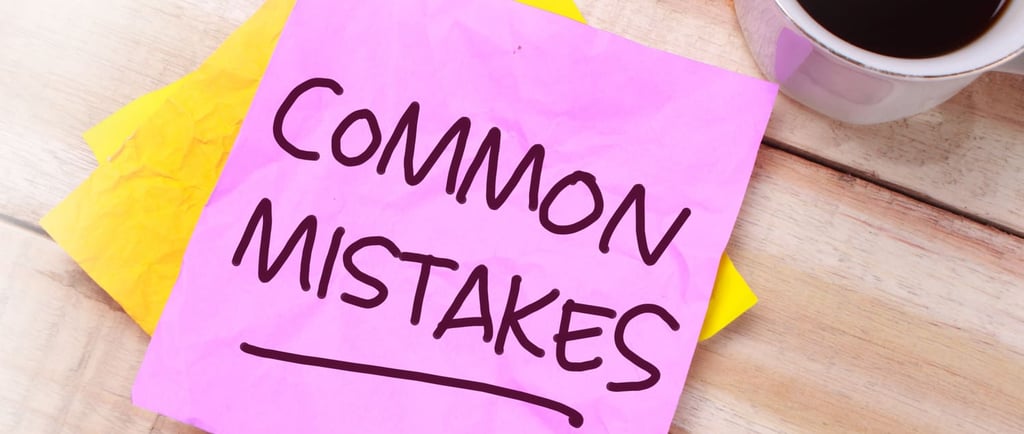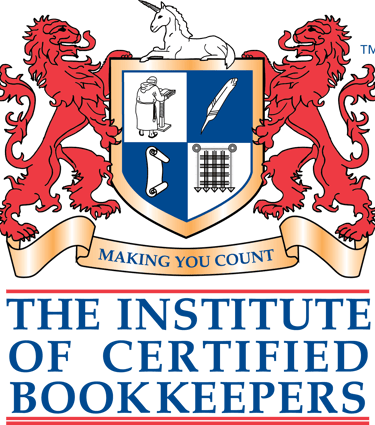The Top 9 Self-Assessment Tax Return Mistakes and How to Avoid Them
Avoid common Self Assessment tax return mistakes with this simple guide. Learn what to watch out for and how to file confidently.
BOOKKEEPING


Filing your Self Assessment tax return can be a bit daunting, but it doesn't have to be! Here are the ten biggest mistakes people often make, along with some friendly tips on how to steer clear of them. With a bit of preparation and awareness of deadlines, you can make your filing experience smooth and stress-free!
What is Self Assessment?
Self Assessment is the system used by HMRC for those who are self-employed or earn income that isn’t automatically taxed through Pay As You Earn (PAYE). If that sounds like you, it’s important to declare all your income and pay the right amount of tax using a Self Assessment tax return.
This also applies to directors and/or shareholders of a limited company who receive dividends or take out a director’s loan. Remember, all types of income must be declared on a tax return.
9 Common Mistakes and How to Avoid Them
1. Forgetting Your Government Gateway User ID
One of the most common hiccups is forgetting your Government Gateway user ID or not registering for one in the first place. Without this ID, you may struggle to file your Self Assessment tax return and could face penalties if you try to submit close to the 31 January deadline.
If you don’t have an account yet, registering on the HMRC website is easy! Just have your National Insurance number, a UK address, a recent payslip or P60, and a valid UK passport handy. After you register, HMRC will send you a 12-digit activation code by post. Please allow approximately 10 days for it to arrive.
2. Missing Your Unique Taxpayer Reference
Another common oversight is forgetting to apply for or losing your Unique Taxpayer Reference (UTR) number. If you’re a first-time Self Assessment filer, setting up your account with HMRC is the way to get your UTR number.
This 10-digit code uniquely identifies you as a taxpayer and is typically received by post approximately 10 days after you apply. Make sure to get this sorted well before the 31 January online filing deadline to avoid stress.
3. Overlooking Tax-Free Allowances
Don’t miss out on tax-free allowances! Many people forget to claim these, which can help lower their tax bill. These allowances are separate from your £12,570 Personal Allowance, which HMRC applies automatically.
Some examples include:
- Blind Person’s Allowance: If you or your spouse is registered blind, claim £3,130 per year.
- Marriage Allowance: Transfer unused Personal Allowance to your partner.
- Rent a Room Scheme: Earn up to £7,500 tax-free by letting out a furnished room in your home.
- Trading and Property Allowance: Claim £1,000 for tax-free income from both trading and propert
Do your homework on these allowances before filing to ensure you’re not missing out on any benefits.
4. Not Planning for Payments on Account
Planning for payments on account is crucial! These are advanced payments HMRC asks you to make toward your next tax bill, including any Class 4 National Insurance contributions if you’re self-employed.
After you file your Self Assessment, remember you’ll need to make two payments on account each year, typically due by midnight on 31 January and 31 July. You can skip these if
- Your last tax bill was under £1,000, or
- You’ve already paid over 80% of all the tax you owe.
By planning, you can avoid any surprises at tax time.
5. Double-Check Your PAYE Income
If you’re working a job where your tax is taken care of through PAYE, it's super important to make sure HMRC has all the correct details about your income on your tax return. If there’s a mistake, you might end up paying more tax than you really need to!
Thanks to Making Tax Digital, most of this information is usually filled in for you automatically. But, it’s always a good idea to verify that everything is accurate—sometimes the numbers may not be reported correctly by your employer, or they might even miss reporting some of your income altogether.
To avoid any surprises, check your P60 or P11D, which will provide a clear summary of what you earned and how much tax you’ve already paid in the last tax year. You can then manually add any missing amounts if necessary.
6. Make the Most of Allowable Expenses
Did you know there are lots of legitimate expenses you can claim to help lower your tax bill? These allowable expenses are essential costs for running your business and can significantly impact your tax liability. They’re tax-deductible, meaning HMRC lets you subtract them from your annual tax bill!
Some common allowable expenses include:
- Office costs: This includes equipment, stationery, and property expenses.
- Travel costs: Think car or van expenses, fuel, parking, and public transport fares.
- Clothing expenses: Uniforms and protective clothing fall into this category.
- Staff costs: Salaries, bonuses, pensions, or subcontractor payments.
- Purchases for resale: Goods and raw materials that you buy to sell.
- Financial costs: Anything from accounting fees to bank charges.
- Business premises: Rent or utility bills for your office or shop.
- Marketing and advertising: Costs for advertisements, subscriptions, or even your website.
- Training courses: That relate specifically to your business.
Remember to keep track of your receipts and records! You won't need to send them in with your Self Assessment tax return, but HMRC might want to take a peek at them someday.
Watch Out for Over-Claiming
While it’s great to claim allowable expenses, some might accidentally over-claim, especially when unsure about what qualifies as a business expense versus a personal one. A legitimate business expense should be related “wholly and exclusively” to running your business.
If you're ever in doubt, check out the HM Revenue HS222 Helpsheet for more clarity. Just remember, claiming things that aren’t legitimate can lead to consequences, including possible penalties. So it’s always best to double-check!
Staying informed and organised can help you navigate the tax process smoothly and save you some money along the way!
7. Don't Miss Out on Tax Relief for Your Private Pension Contributions!
If you're making contributions to a private pension, here's something important to note: You could be eligible for up to 100% tax relief on your annual earnings. This can be a game-changer, especially for those in higher tax brackets who might be overpaying hundreds of millions of pounds in taxes every year simply because they aren't claiming this relief.
Here's how you can benefit automatically:
- If your employer deducts workplace pension contributions from your salary, or
- If you're contributing to a private pension and you pay Income Tax at 20%, your pension provider should already claim the basic tax relief for you and add it to your pot. It's always good to double-check that this relief has been claimed, as not all providers are required to do so.
Now, if you're a higher-rate (40%) or additional-rate (45%) taxpayer, you'll need to apply for that extra 20% or 25% through your Self Assessment tax return. The way you receive this relief can be quite helpful:
- It might reduce your current tax bill,
- You could get a tax rebate,
- Or it may result in a change to your tax code so you pay less tax next year.
A friendly reminder: HMRC won't nudge you to claim this additional tax relief, so remember to do it each year! If you haven't claimed it before, you might be able to reclaim for up to four previous years—so it's worth checking!
If you're still unsure about how your pension contributions are taxed, the GOV.UK website is a great starting point.
8. Keep an Eye on Those Deadlines!
Let's chat about deadlines—timing is everything, right? We've already mentioned getting your UTR and registering for Self Assessment, but those aren't the only important dates to remember
The deadline for submitting your Self Assessment online is January 31st every year. A little tip: there was a rare exception in 2021 due to COVID-19, and they extended it to February 28th; however, such extensions are pretty uncommon. So, it's best to have your return completed well before January 31st!
If you miss this deadline (and haven't received an extension), you could face penalties ranging from a £100 fine all the way up to 100% of your tax bill. Yes, you read that correctly—filing late could mean doubling your tax payment!
And don't forget: January 31st isn't just for filing your return; it's also the deadline for any tax payments owed (including your first payment on account). HMRC will charge you interest on late payments, so it's super important to file early and set aside enough money to cover your bill on time.
Stay on top of these deadlines, and you'll be in a great spot! If you need any assistance or would like to discuss this further, please don't hesitate to reach out. You've got this!
9. Understanding the High Income Child Benefit Tax Charge and Charitable Donations
If you're one of the 7.2 million families in the UK receiving Child Benefits, that’s fantastic—it really helps with the expenses. But here’s something important to keep in mind: if you (or your partner) earn more than £60,000 a year, you might have to deal with something called the High Income Child Benefit Charge.
Here’s a quick breakdown: for every £200 you earn over £60,000, you’ll owe 1% of your Child Benefit. So, if your income goes beyond £80,000, the charge could equal your Child Benefit payment. Yikes, right? But don’t worry! You can manage this through your Self Assessment tax return, so it’s best to be prepared.
And here’s a silver lining: you have a couple of options to handle this charge. For instance, making a pension contribution can help lower your ‘adjusted net income’ and potentially reduce the tax charge. Alternatively, if your income is over £80,000, you could choose not to receive Child Benefit, which makes things a bit easier when tax time rolls around.
Suppose you’re curious to learn more about the High Income Child Benefit Tax Charge, the GOV.UK website has all the details you’ll need.
Now, let’s talk about charitable donations! Did you know you can actually lower your taxes by claiming contributions made to registered charities or Community Amateur Sports Clubs (CASC)? That’s right! Thanks to Gift Aid, your contributions can be even more beneficial. For every £1 you donate, charities can claim an extra 25p from the UK Government.
So, if you’re a high earner and donate £100, that charity can receive £125 without you having to give anything extra! When you fill out your Self Assessment tax return, you can choose to claim the £100 to lower your tax bill, or you can go for the whole £125 if you’re okay with paying 40% tax on the extra £25. Many folks opt for the more straightforward route of just claiming £100, but if you've made larger donations, claiming Gift Aid can save you even more.
Just remember, being proactive about these points can make a real difference come tax time.
Other Common Self-Assessment Mistakes to Watch Out For
We've already talked about some of the biggest pitfalls people encounter when filing their Self Assessment tax returns, but there are plenty of other little errors that can sneak in. Let’s take a look at some common mistakes to keep an eye on:
- Calculation Errors: Mistakes in your calculations can lead to complications, so double-check your numbers!
- Wrong Tax Code: Make sure you're using the correct tax code—it's easy to check on the HMRC website.
- Incorrect National Insurance and UTR Numbers: These details are crucial, so double-check them before submitting.
- Incomplete Information: Avoid writing ‘to be confirmed’ or ‘info to follow’, as HMRC needs all the required information upfront.
- Ticking the Wrong Boxes: It’s a simple error that can confuse, so read through carefully.
- Not Reporting Interest on Savings: Even the most minor amounts of interest should be declared.
- Failing to Declare All Income: Be sure to report every source of income to avoid any issues.
- Not Declaring Capital Gains: If you've made a profit from selling assets, remember to declare that too!
- Missing Supplementary Pages: Depending on your situation, you should include extra pages with your SA100 form.
- Forgetting to Sign and Date Your Return: This is particularly important for paper returns, so don’t skip it!
What to Do If You Make a Mistake
If you find that you've made a mistake on your tax return, don’t worry! You've got 12 months from the submission deadline to make amendments. Just follow HMRC’s guide on correcting tax returns and resubmit.
Your tax bill will be adjusted based on the changes you make—this might mean paying a bit more or even receiving a refund.
If HMRC spots a problem with your return, they may impose a penalty. However, if you’ve done your best and made a genuine mistake, you shouldn't face any penalties. And if you do receive one, remember that you have the right to appeal!
Keep in mind, HMRC may look into your tax affairs if they notice inconsistencies, if you consistently file late, or if your expenses seem unusually high compared to others in your industry.
Stay on top of your tax return, and you’ll be just fine!
Wrapping Up
Filing your Self Assessment tax return doesn’t have to be a stressful experience. By keeping these common mistakes in mind and preparing in advance, you can navigate the process with confidence. Happy filing!






